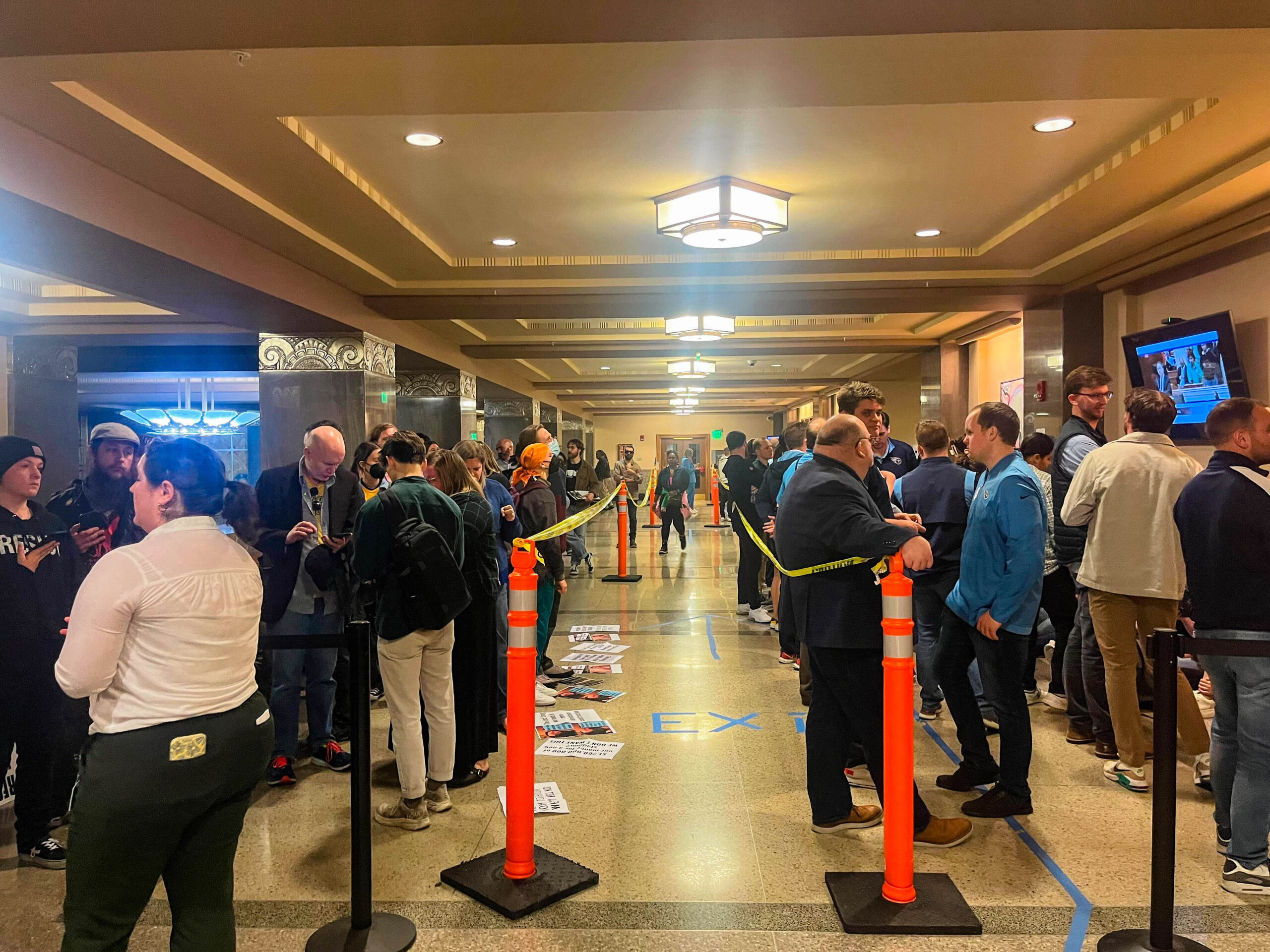
Metro Council passed the new Titans stadium deal in the early morning hours Wednesday, capping off a contentious year of negotiations to bring a new NFL stadium to Nashville.
The deal represents the largest sports subsidy in U.S. history by nearly 50%. The $2.1 billion agreement sees the city contributing $760 million and the state coming up with another $500 million.
The final vote arrived during a hard-fought, seven-hour public hearing. The time was divided equally amongst the “support” and “opposition” sides.
 Cynthia Abrams WPLN News
Cynthia Abrams WPLN NewsSupporters and opponents of a new Titans stadium deal line opposite sides of the Metro Courthouse.
Supporters of the deal were up first. The group was largely compromised of business owners, hospitality industry leaders and chambers of commerce representatives.
Adolpho Birch III, the senior vice president of the Tennessee Titans, was the last to speak in favor of the deal.
“These speakers have one thing in common. Like the hundreds of folks who work with me at our practice field and in our stadium on game days — they care about the future of Nashville and the people who live here,” Birch said. “And they understand that tonight’s vote is a unique opportunity to propel the city forward in a way that we can be proud of for generations.”
Supporters did not use the entirety of their allotted time. Conversely, opponents used all two hours — and still, that was not enough. Many of those waiting in the “opposition” queue did not have a chance to step up to the microphone during the budgeted time. An amendment proposed by District 19 Councilmember Freddie O’Connell allowed for the hearing to continue.
While those in favor reiterated the deal’s benefits for Nashville, those against saw it as the city, once again, prioritizing the interests of corporations over its residents.
 Cynthia Abrams WPLN News
Cynthia Abrams WPLN NewsA sign from the opposition side during the April 26 Metro Council meeting to vote on a new Titans stadium
Nashville resident Alexandria Danner questioned the use of the funds.
“This body is spending $760 million taxpayer dollars on a sports stadium that benefits millionaires and big businesses, but somehow cannot afford to address the multiple crises affecting working class citizens,” Danner said.
“We keep hearing that this deal will be good for Nashville, but good for whom? The people who spoke in support of this deal were wealthy business owners who only care for their own financial gain. The people you see before you now are the people who struggle to hold this city together.”
Despite the “opposed” speakers outnumbering those in favor, the Metro Council proceeded to pass the deal on a 26-12 vote.
Throughout the process, Mayor Cooper has been one of the lead proponents of the deal. Renovating the existing stadium was initially floated as an option. A consultation estimated the costs of that project at around $1.8 billion, a number that Cooper said was “financially irresponsible.” Some councilmembers have said that this renovation number is inaccurate.
Cooper issued a statement last week, praising the “transparent and thorough process.”
“I appreciate Metro Council’s diligent and thoughtful consideration of this deal, and their consistent vote of confidence that this is the right move for Nashville taxpayers,” Cooper said.
Councilmembers opposed to the deal tried a number of last-minute tactics to derail its passage.
Early in the day, District 7 Councilmember Emily Benedict floated the idea of skipping the meeting to deny a quorum and prevent the vote. Metro Council requires at least two-thirds of members be present to call a vote. When it became clear that a quorum would not be denied, Benedict did appear and vote.
A number of amendments were also proposed. Third readings typically do not allow for amendment introductions. They would require a suspension of the rules to consider, but the suspension saw more than two objections — preventing the introductions.
Ahead of the meeting, District 16 Councilmember Ginny Welsch passed around a sheet with the names and totals of donations councilmembers received from Titans lobbyists.
The list featured fourteen councilmembers: Sharon Hurt, Courtney Johnston, Nancy Van Reece, Jennifer Gamble, Jeff Syracuse, Russ Pulley, John Rutherford, Kyontzé Toombs, Tonya Hancock, Burkley Allen, Antoinette Lee, Zach Young, Zulfat Suara and Erin Evans.
Later, Councilmember Welsch spoke against the proposal.
“The details of this deal, which are bad, work against Nashville. And none of those arguments in favor upheld the idea that this deal is pressing, needs to happen right now, needs to happen tonight. None of them did that,” Welsch said. “That urgency has been manufactured by the mayor and the Titans.”
The final last-ditch effort took place immediately after the vote. Councilmember Delishia Porterfield, who had voted “yes” on the deal, filed a motion to reconsider. While Porterfield is an opponent of the stadium, her affirmative vote qualified her to request the reconsideration motion, a rarely used procedure. The motion was acknowledged by the chair, but ultimately overruled by the majority of the body.
The new stadium could be ready as early as the 2026 NFL season. Until then, the Titans will continue to play at Nissan Stadium.
Update: This story has been updated to provide additional information about Councilmember Delishia Porterfield’s vote for the stadium deal.

